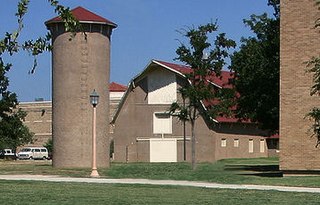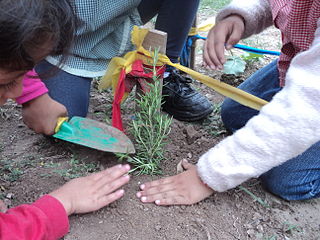
Pedagogy, most commonly understood as the approach to teaching, is the theory and practice of learning, and how this process influences, and is influenced by, the social, political, and psychological development of learners. Pedagogy, taken as an academic discipline, is the study of how knowledge and skills are imparted in an educational context, and it considers the interactions that take place during learning. Both the theory and practice of pedagogy vary greatly as they reflect different social, political, and cultural contexts.
The Reggio Emilia approach is an educational philosophy and pedagogy focused on preschool and primary education. This approach is a student-centered and constructivist self-guided curriculum that uses self-directed, experiential learning in relationship-driven environments. The programme is based on the principles of respect, responsibility and community through exploration, discovery and play.

Experiential education is a philosophy of education that describes the process that occurs between a teacher and student that infuses direct experience with the learning environment and content. This concept is distinct from experiential learning, however experiential learning is a subfield and operates under the methodologies associated with experiential education. The Association for Experiential Education regards experiential education as "a philosophy that informs many methodologies in which educators purposefully engage with learners in direct experience and focused reflection in order to increase knowledge, develop skills, clarify values, and develop people's capacity to contribute to their communities". The Journal of Experiential Education publishes peer-reviewed empirical and theoretical academic research within the field.

Outdoor education is organized learning that takes place in the outdoors, such as during school camping trips. Outdoor education programs sometimes involve residential or journey wilderness-based experiences which engage participants in a variety of adventurous challenges and outdoor activities such as hiking, climbing, canoeing, ropes courses and group games. Outdoor education draws upon the philosophy, theory, and practices of experiential education and environmental education.

Environmental education (EE) refers to organized efforts to teach how natural environments function, and particularly, how human beings can manage behavior and ecosystems to live sustainably. It is a multi-disciplinary field integrating disciplines such as biology, chemistry, physics, ecology, earth science, atmospheric science, mathematics, and geography.

Agricultural education is the systematic and organized teaching, instruction and training available to students, farmers or individuals interested in the science, business and technology of agriculture as well as the management of land, environment and natural resources.
Culturally relevant teaching is instruction that takes into account students' cultural differences. Making education culturally relevant is thought to improve academic achievement, but understandings of the construct have developed over time Key characteristics and principles define the term, and research has allowed for the development and sharing of guidelines and associated teaching practices. Although examples of culturally relevant teaching programs exist, implementing it can be challenging.
Science, technology, society and environment (STSE) education, originates from the science technology and society (STS) movement in science education. This is an outlook on science education that emphasizes the teaching of scientific and technological developments in their cultural, economic, social and political contexts. In this view of science education, students are encouraged to engage in issues pertaining to the impact of science on everyday life and make responsible decisions about how to address such issues
Inquiry-based learning is a form of active learning that starts by posing questions, problems or scenarios. It contrasts with traditional education, which generally relies on the teacher presenting facts and their knowledge about the subject. Inquiry-based learning is often assisted by a facilitator rather than a lecturer. Inquirers will identify and research issues and questions to develop knowledge or solutions. Inquiry-based learning includes problem-based learning, and is generally used in small-scale investigations and projects, as well as research. The inquiry-based instruction is principally very closely related to the development and practice of thinking and problem-solving skills.
The ecopedagogy movement is an outgrowth of the theory and practice of critical pedagogy, a body of educational praxis influenced by the philosopher and educator Paulo Freire. Ecopedagogy's mission is to develop a robust appreciation for the collective potentials of humanity and to foster social justice throughout the world. It does so as part of a future-oriented, ecological and political vision that radically opposes the globalization of ideologies such as neoliberalism and imperialism, while also attempting to foment forms of critical ecoliteracy. Recently, there have been attempts to integrate critical eco-pedagogy, as defined by Greg Misiaszek with Modern Stoic philosophy to create Stoic eco-pedagogy.

Garden-based learning (GBL) encompasses programs, activities and projects in which the garden is the foundation for integrated learning, in and across disciplines, through active, engaging, real-world experiences that have personal meaning for children, youth, adults and communities in an informal outside learning setting. Garden-based learning is an instructional strategy that utilizes the garden as a teaching tool.
The Center for Ecoliteracy (CEL) is a nonprofit organization dedicated to education for sustainable living.
Glen Urquhart School is an independent, coeducational day school for students in grades pre-K through grade eight, located in Beverly Farms, Massachusetts.

Thematic teaching is the selecting and highlighting of a theme through an instructional unit or module, course, or multiple courses. It is often interdisciplinary, highlighting the relationship of knowledge across academic disciplines and everyday life. Themes can be topics or take the form of overarching questions. Thematic learning is closely related to interdisciplinary or integrated instruction, topic-, project- or phenomenon-based learning. Thematic teaching is commonly associated with elementary classrooms and middle schools using a team-based approach, but this pedagogy is equally relevant in secondary schools and with adult learners. A common application is that of second or foreign language teaching, where the approach is more commonly known as theme-based instruction. Thematic instruction assumes students learn best when they can associate new information holistically with across the entire curriculum and with their own lives, experiences, and communities.

Indigenous education specifically focuses on teaching Indigenous knowledge, models, methods, and content within formal or non-formal educational systems. The growing recognition and use of Indigenous education methods can be a response to the erosion and loss of Indigenous knowledge through the processes of colonialism, globalization, and modernity. Indigenous education also refers to the teaching of the history, culture, and languages of Indigenous peoples of a region.
The field of music education contains a number of learning theories that specify how students learn music based on behavioral and cognitive psychology.

The term learning environment can refer to an educational approach, cultural context, or physical setting in which teaching and learning occur. The term is commonly used as a more definitive alternative to "classroom", but it typically refers to the context of educational philosophy or knowledge experienced by the student and may also encompass a variety of learning cultures—its presiding ethos and characteristics, how individuals interact, governing structures, and philosophy. In a societal sense, learning environment may refer to the culture of the population it serves and of their location. Learning environments are highly diverse in use, learning styles, organization, and educational institution. The culture and context of a place or organization includes such factors as a way of thinking, behaving, or working, also known as organizational culture. For a learning environment such as an educational institution, it also includes such factors as operational characteristics of the instructors, instructional group, or institution; the philosophy or knowledge experienced by the student and may also encompass a variety of learning cultures—its presiding ethos and characteristics, how individuals interact, governing structures, and philosophy in learning styles and pedagogies used; and the societal culture of where the learning is occurring. Although physical environments do not determine educational activities, there is evidence of a relationship between school settings and the activities that take place there.

Learning space or learning setting refers to a physical setting for a learning environment, a place in which teaching and learning occur. The term is commonly used as a more definitive alternative to "classroom," but it may also refer to an indoor or outdoor location, either actual or virtual. Learning spaces are highly diverse in use, configuration, location, and educational institution. They support a variety of pedagogies, including quiet study, passive or active learning, kinesthetic or physical learning, vocational learning, experiential learning, and others. As the design of a learning space impacts the learning process, it is deemed important to design a learning space with the learning process in mind.
Critical pedagogy of place is a curricular approach to education that combines critical pedagogy and place-based education. It started as an attitude and approach to place-based and land-based education that criticized place-based education's invisible endorsement of colonial narratives and domineering relationships with the land. The scholars critiquing place-based education mainly focused on re-centering Indigenous voices in the curriculum. In the early 1990s, C.A. Bowers advocated for a critical pedagogy of place that acknowledged our enmeshment in cultural and ecological systems, and the resulting need for this to figure in the school curriculum. In 2003, David A. Greenwood introduced and defined the term "Critical Pedagogy of Place." In the years since, the general ideas of critical pedagogy of place have been incorporated into many scholars' critiques of place-based, land-based, and environmental education.

Climate change education (CCE) is education that aims to address and develop effective responses to climate change. It helps learners understand the causes and consequences of climate change, prepares them to live with the impacts of climate change and empowers learners to take appropriate actions to adopt more sustainable lifestyles. Climate change and climate change education are global challenges that can be anchored in the curriculum in order to provide local learning and widen up mindset shifts on how climate change can be mitigated. In such as case CCE is more than climate change literacy but understanding ways of dealing with climate









